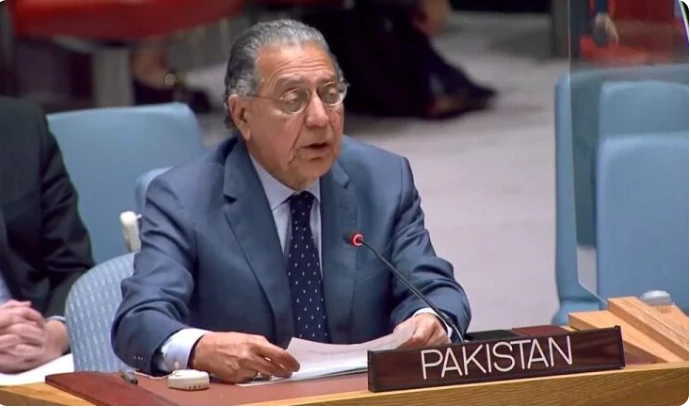Pakistan demands UN probe into TTP acquiring modern weapons for terror acts

Stay tuned with 24 News HD Android App

A senior Pakistani diplomat told the United Nations Security Council Wednesday that the Tehreek-e-Taliban Pakistan (TTP) obviously has freedom to conduct cross-border attacks against Pakistan, and demanded a UN probe to determine how this terrorist group acquired advanced weapons that it is using now.
“We also have clear evidence that the TTP receives support from our main adversary,” Ambassador Munir Akam said, in an obvious reference to India, during a Council debate on the situation in Afghanistan.
The Pakistani envoy said that TTP and its affiliates have carried out a series of organized cross-border terrorist attacks on Pakistan’s soil, noting that the group has access to weapons originating in the stock left behind by foreign forces, which were led by the United States.
“Yet,” Ambassador Akram said, “the question is: how did the TTP – a listed terrorist organization –secured these weapons?”
In this regard, he demanded that the United Nations – whether UNAMA or another agency – conduct a thorough investigation to elicit how these weapons got into the hands of the TTP and to identify ways of retrieving them.
“While the interim authorities (Taliban) have reported some success in the fight against Da’esh, the fact is that a number of terrorist groups are living in Afghanistan, evidently under the protection of the Afghan Interim Government,” the Pakistani envoy told the 15-member Council.
Meanwhile, Jose Javier de la Gasca of Ecuador, chairman of the Security Council committee established pursuant to resolution 1988 (2011), which overseas sanctions imposed by the Council, also said that two years after the Taliban took power, certain terrorist groups have attained greater freedom of action, increasing threats in neighbouring countries.
The Ecuadorian diplomat is currently also serving as president of the UN Security Council for the month of December.
Noting that the effectiveness and honesty of measures adopted by the Taliban to counter certain groups are still not clear, he highlighted the threat posed by foreign terrorist combatants for neighbouring States.
Although the Taliban are fighting against Islamic State in Iraq and the Levant-Khorasan (ISIL-K), that group maintains a capacity for large-scale attacks, he said, calling it the most serious domestic threat within the country.
Furthermore, Ambassador Gasca said the links between the Taliban and Al‑Qaeda and Tehrik-i-Taliban Pakistan are strong.
The Taliban overran Afghanistan in mid-August 2021 as U.S. and NATO troops were in the last weeks of their chaotic pullout from the country after 20 years of war. In the face of the Taliban sweep, the US-backed and trained Afghan military crumbled.
In his remarks, the Pakistani envoy said, “We have lost hundreds of our brave soldiers and civilians in these attacks just this year alone and last week, TTP affiliated group carried out a heinous attack on our security personnel in Dera Ismail Khan, resulting in the loss of more than 23 precious lives.”
Stressing that peace in Afghanistan is a strategic imperative for Pakistan, Ambassador Akram noted that the Afghan interim authorities have brought some modicum of stability to the war-torn country. Law and order has improved, action is being taken against Da’esh and corruption has declined.
The Pakistani envoy called for reversing restrictions on women and girls’ right to education, saying some pragmatic solutions are possible. “Pakistan will continue to work to develop such possible solutions.”
Noting that Pakistan has been the main artery for provision of human assistance to Afghanistan, he said the humanitarian response plan remains severely underfunded at 35 per cent and called on all donor States to respond generously.
Pointing to irregular cash flows and a fragile banking system with no safeguards against terrorist financing, the Pakistani envoy stressed the need for regional connectivity projects.
Pakistan, he said, has paid an enormous price for “40 years of generosity” to Afghanistan, he said, noting that it has been hosting refugees with little or no support from the international community.
Since the interim Government of Afghanistan claims peace has been restored, it should work to arrange early repatriation of these refugees, Ambassador Akram said.
Describing the repatriation of undocumented Afghans as an unavoidable compulsion arising from Pakistan’s legitimate economic and social concerns, he said it is being implemented as humanely as possible.
“We have made exceptions for those who have proof of registration (PoRs); for those who have the Afghan citizenship card and now also for those who are considered vulnerable,” Ambassador Akram said, pointing out those are besides the 60,000 or more who are waiting for two years to be relocated to third countries.
“We urge those third countries to accelerate their process in order to receive these people who they have agreed to receive as such and lighten the burden on Pakistan.”
Further, he said, any engagement with Afghanistan’s authorities must be based on its response on a number of matters, including actions to control the activities of terrorist organizations, he stressed. “Else, we will see the recurrence and proliferation of terrorism from Afghanistan as happened prior to 9/11, threatening not only the region but the entire world.”
Opening the debate, Roza Isakovna Otunbayeva, the Special Representative of the Secretary-General for Afghanistan and Head of the United Nations Assistance Mission in Afghanistan (UNAMA), said that there must be more direct engagement with the de facto authorities, including in Kabul.
“Dialogue does not legitimize,” but it can encourage change, she said.
While the Taliban maintain that their ban on girls’ education and employment for women are internal matters, UNAMA has had successful interactions with them on such issues as climate, microfinance, counter-narcotics and drug addiction, demining, private sector development, human rights and governance, she said.
